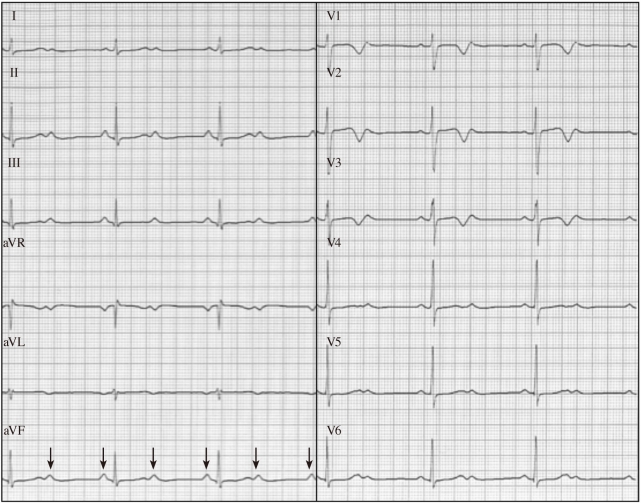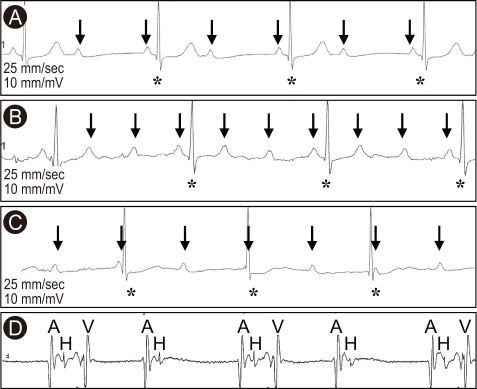Abstract
Anti-Ro autoantibody is associated with Sjögren's syndrome (SS), systemic lupus erythematosus (SLE), and neonatal lupus syndrome (i.e., congenital complete heart block in newborns). Generally, the adult atrioventricular (AV) node is believed to be relatively resistant to the scarring effects of anti-Ro/anti-La autoantibodies. However, there have been some reports of adult complete AV block in SS and SLE patients. Here, we report a case of complete heart block in primary SS with anti-Ro autoantibodies, with no other risk factor for the development of heart block, and review their etiological association.
Keywords: Ro antibodies, Sjögren's syndrome, Atrioventricular block
INTRODUCTION
Sjögren's syndrome (SS) is a systemic autoimmune disease of unknown etiology that is characterized by sicca symptoms of the eye and oral cavity [1]. Anti-Ro autoantibodies of a SS mother are associated with a congenital heart block in newborns as a feature of neonatal lupus syndrome [2]. However, this condition is relatively rare in adults, because the adult atrioventricular (AV) node is believed to be relatively resistant to the damaging effects of anti-Ro/anti-La autoantibodies [3]. Nevertheless, there are some reports of an adult complete AV block in SS and systemic lupus erythematosus (SLE) patients [4-6].
Here, we report a case of complete heart block in an adult SS patient, and speculate on the effects of anti-Ro autoantibodies in the adult cardiac conduction system.
CASE REPORT
A 49-year-old woman visited the cardiology outpatient clinic for evaluation of easy fatigability and effort-related dizziness that had been aggravated for several months. She was diagnosed with primary SS at the rheumatology department as a result of xerostomia, keratoconjunctivitis sicca, a positive Shirmer test, and the presence of anti-Ro antibodies. Salivary gland scintigraphy and biopsy were not performed because the patient refused these procedures. She did not suffer from diabetes, hypertension, or hypercholesterolemia. She also denied any family history of medical illness or previous or current smoking. Her clinical course had been relatively stable until recently and there had been no change in her medications, which included low-dose oral glucocorticoids and pilocarpine.
At the time of presentation to the cardiology department, her blood pressure was 140/90 mmHg. However, her heart beat was regular but only 42 bpm. She was alert and had a normal body temperature. A thorough review of her systems revealed no other abnormality, but recently she had presented with intermittent near-syncope.
Laboratory examination showed normal hemoglobin, total cholesterol, and liver and thyroid function tests. There was no abnormality in electrolyte levels. Antinuclear antibodies were positive at 1:160 with a discrete speckled pattern. No antibody to dsDNA was found. Anti-Ro antibodies were still positive but anti-La antibodies were negative.
Electrocardiographic examination revealed a 2:1 AV block in the resting state (Fig. 1). However, at peak exercise in a treadmill test, the electrocardiogram worsened to a high-degree (3:1) AV block. Holter monitoring (24 hours) revealed varying degrees (2:1, 3:1, complete) of AV block (Fig. 2A-2C). Intracardiac electrocardiography showed an infra-His block (Fig. 2D). Echocardiography revealed normal left ventricular function and no other valvular abnormality.
Figure 1.
The resting electrocardiogram showed 2:1 atrioventricular block. The arrows indicate the P wave.
Figure 2.
Holter monitoring showed variable atrioventricular (AV) block. (A) 2:1 AV block. (B) 3:1 AV block. (C) Complete AV block. Intracardiac electrocardiogram showed infra-His block (D). Arrow, P wave; asterisk, QRS wave; A, atrial electrogram; H, His recording; V, ventricular electrogram.
To treat the symptomatic high-degree heart block, a permanent cardiac pacemaker was implanted and paced in VDD mode. Since then, she has not had any specific complaint and has retained an adequate AV conduction rate.
DISCUSSION
Anti-Ro autoantibodies are related to the clinical manifestations of several autoimmune diseases [7]. Among them, anti-Ro autoantibodies are strongly associated with congenital heart block in neonatal lupus syndrome. As reviewed by Lee at al. [4], more anti-Ro autoantibodies are present in the heart than in other, unaffected organs [8], where they interfere with the repolarization that results in the development of heart block in isolated rabbit myocardial tissue perfused with serum from maternal rabbits with anti-Ro autoantibodies [9].
However, the incidence of congenital heart block in neonates exposed to maternal anti-Ro autoantibody is only approximately 2% [2], and cases of adult cardiac conduction abnormalities are extremely rare. The causal relationship between anti-Ro autoantibody and the scarring of the adult cardiac conduction system is difficult to evaluate. The resistance of adult cardiac tissue to anti-Ro autoantibodies is controversial. It has been shown that the antibody does not attach to adult rabbit myocytes [9]. On the other hand, Garcia et al. [10] reported a conduction abnormality in adult rabbit cardiac tissue. Boutjdir et al reported that, rather than a 60-kDa anti-Ro autoantibody, a 52-kDa antibody was a more specific cause of the conduction abnormality, and they demonstrated heart block in rabbit cardiac tissue using only the 52-kDa fragment of the antibody. Lodde et al analyzed 51 primary SS patients, and found that the disease activity expressed by the lymphocyte focus score, and IgG, anti-cardiolipin antibody and anti-La autoantibody, but not anti Ro autoantibody, was associated with prolonged PR intervals.
After the initial report of Moffit, several cases of complete heart block in adult SLE patients have been reported. Whether as an initial manifestation or after SLE is established, anti-Ro autoantibody is not consistently related to heart block in SLE patients [4,5].
To our knowledge, this is the third report of arrhythmogenic anti-Ro autoantibodies in an adult SS patient; however, one patient had coexisting hypopituitarism [4]. Our patient did not have a familial or genetic background of heart block, and there was no apparent structural abnormality in the conduction system. Endocrine disorders, such as thyroid disease, were ruled out by laboratory examination, and no particular drug that could have induced the arrhythmia had been prescribed.
In summary, the effect of the anti-Ro autoantibody on adult cardiac tissue or conduction system requires more investigation. There have only been a few case reports and they have had controversial results; thus, it is difficult to confirm that anti-Ro autoantibodies can cause adult cardiac conduction abnormalities, or even fetal heart cardiac conduction abnormalities. The possibility of a causal association highlights the need for more advanced research on the pathophysiology of heart block in SS or SLE patients.
Footnotes
No potential conflict of interest relevant to this article was reported.
References
- 1.Kassan SS, Moutsopoulos HM. Clinical manifestations and early diagnosis of Sjögren syndrome. Arch Intern Med. 2004;164:1275–1284. doi: 10.1001/archinte.164.12.1275. [DOI] [PubMed] [Google Scholar]
- 2.Lee LA. Transient autoimmunity related to maternal autoantibodies: neonatal lupus. Autoimmun Rev. 2005;4:207–213. doi: 10.1016/j.autrev.2004.11.003. [DOI] [PubMed] [Google Scholar]
- 3.Boutjdir M. Molecular and ionic basis of congenital complete heart block. Trends Cardiovasc Med. 2000;10:114–122. doi: 10.1016/s1050-1738(00)00059-1. [DOI] [PubMed] [Google Scholar]
- 4.Lee LA, Pickrell MB, Reichlin M. Development of complete heart block in an adult patient with Sjögren's syndrome and anti-Ro/SS-A autoantibodies. Arthritis Rheum. 1996;39:1427–1429. doi: 10.1002/art.1780390825. [DOI] [PubMed] [Google Scholar]
- 5.Maier WP, Ramirez HE, Miller SB. Complete heart block as the initial manifestation of systemic lupus erythematosus. Arch Intern Med. 1987;147:170–171. [PubMed] [Google Scholar]
- 6.Mevorach D, Raz E, Shalev O, Steiner I, Ben-Chetrit E. Complete heart block and seizures in an adult with systemic lupus erythematosus: a possible pathophysiologic role for anti-SS-A/Ro and anti-SS-B/La autoantibodies. Arthritis Rheum. 1993;36:259–262. doi: 10.1002/art.1780360219. [DOI] [PubMed] [Google Scholar]
- 7.Salomonsson S, Wahren-Herlenius M. Local production of Ro/SSA and La/SSB autoantibodies in the target organ coincides with high levels of circulating antibodies in sera of patients with Sjögren's syndrome. Scand J Rheumatol. 2003;32:79–82. doi: 10.1080/03009740310000076. [DOI] [PubMed] [Google Scholar]
- 8.Reichlin M, Brucato A, Frank MB, et al. Concentration of autoantibodies to native 60-kd Ro/SS-A and denatured 52-kd Ro/SS-A in eluates from the heart of a child who died with congenital complete heart block. Arthritis Rheum. 1994;37:1698–1703. doi: 10.1002/art.1780371120. [DOI] [PubMed] [Google Scholar]
- 9.Alexander E, Buyon JP, Provost TT, Guarnieri T. Anti-Ro/SS-A antibodies in the pathophysiology of congenital heart block in neonatal lupus syndrome, an experimental model: in vitro electrophysiologic and immunocytochemical studies. Arthritis Rheum. 1992;35:176–189. doi: 10.1002/art.1780350209. [DOI] [PubMed] [Google Scholar]
- 10.Garcia S, Nascimento JH, Bonfa E, et al. Cellular mechanism of the conduction abnormalities induced by serum from anti-Ro/SSA-positive patients in rabbit hearts. J Clin Invest. 1994;93:718–724. doi: 10.1172/JCI117025. [DOI] [PMC free article] [PubMed] [Google Scholar]




